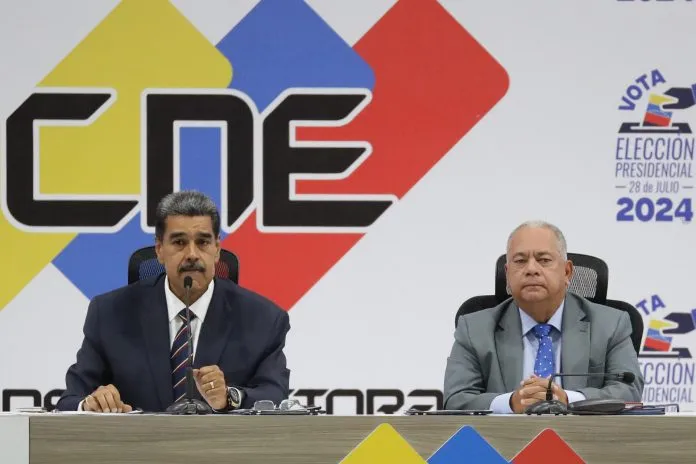Introduction
The political landscape in Venezuela remains deeply unsettled following recent presidential elections marked by widespread allegations of irregularities and inconsistencies. As the nation grapples with the fallout from these elections, the official website of the National Electoral Council (CNE) remains offline, further fueling the public’s concerns about the electoral process. This article delves into the ongoing issues surrounding the election results, the implications of the website outage, and the reactions from various political figures and factions.
The Website Outage and Electoral Results
The Ongoing Website Disruption
As of nearly 48 hours after the CNE’s announcement of the presidential election results, the Council’s official website remains inaccessible. This extended outage has compounded the frustration and confusion among Venezuelan citizens and international observers alike. The website’s downtime comes at a crucial time when transparency and accessibility of electoral data are paramount.

Official Results Announced by Elvis Amoroso
On the day following the elections, Elvis Amoroso, a prominent member of the ruling Socialist Party, declared Nicolás Maduro as the winner of the presidential race. According to Amoroso, Maduro secured approximately 80% of the vote, totaling 5,150,092 votes. In contrast, his opponent, Edmundo González Urrutia, reportedly received 4,445,978 votes.
Despite these figures, significant doubts remain regarding the legitimacy of the announced results. The CNE has yet to provide conclusive evidence to substantiate Maduro’s victory. The lack of accessible data and detailed results has only heightened skepticism and dissatisfaction among voters and political analysts.
Allegations and Discrepancies in the Electoral Process
Reports of Irregularities and Inconsistencies
The electoral process has been marred by numerous allegations of irregularities. Observers and opposition leaders have pointed out several discrepancies between the official results and the information available from various voting centers. Reports suggest inconsistencies in vote counts and procedural anomalies that have cast doubt on the integrity of the electoral process.
Opposition’s Counterclaim and Evidence
In response to the official results, the opposition, led by Edmundo González Urrutia and María Corina Machado, has mounted a challenge. The opposition has launched a dedicated website where citizens can access the electoral records from their respective voting centers. This initiative aims to provide transparency and counteract the official narrative.
According to Machado, the opposition has managed to obtain and verify 73% of the total election records. She asserts that these documents indicate a substantial victory for González Urrutia. Specifically, Machado claims that González Urrutia received 6,275,182 votes, compared to Maduro’s 2,759,256 votes. The remaining records are yet to be accounted for, but the opposition maintains that their evidence supports González Urrutia’s claim to the presidency.
Government and Military Responses
Defense Minister’s Statement
In a striking turn of events, Defense Minister Vladimir Padrino López has accused the opposition of orchestrating what he describes as a coup attempt. During a press conference, Padrino López claimed that the opposition’s calls for transparency and their challenge to the election results are part of a broader conspiracy, allegedly backed by foreign interests.
According to Padrino López, these actions represent a coordinated effort by extremist factions and their international allies to undermine Venezuela’s political stability. The Defense Minister’s comments reflect a high level of tension and indicate that the current political climate in Venezuela is highly charged and contentious.
The Importance of Transparency and Public Trust
The Role of Electoral Transparency
Electoral transparency is crucial for maintaining public trust and ensuring the legitimacy of the democratic process. The ongoing issues with the CNE’s website and the conflicting reports about the election results underscore the need for clear and accessible information. Transparency in the electoral process helps to validate the results and address concerns about potential fraud or manipulation.
The Impact on Public Confidence
The prolonged website outage and the conflicting results have eroded public confidence in the electoral system. Voters and observers are left without crucial information, leading to increased speculation and distrust. Ensuring that electoral data is readily available and accurately reported is essential for restoring faith in the democratic process and addressing the concerns of all stakeholders.
Conclusion
The current electoral crisis in Venezuela highlights significant challenges related to transparency, public trust, and political stability. The ongoing website outage and conflicting reports about the election results have exacerbated tensions and fueled skepticism. As the situation continues to develop, it remains crucial for all parties involved to prioritize transparency and work towards resolving the discrepancies in a manner that upholds democratic principles and ensures the protection of citizens’ rights.
For more in-depth coverage and updates on Latin American affairs, visit the Latin America section on The Meridian Times.


